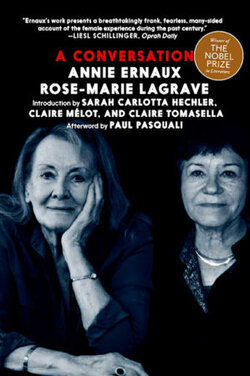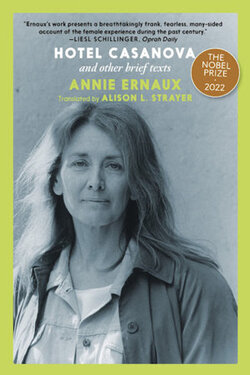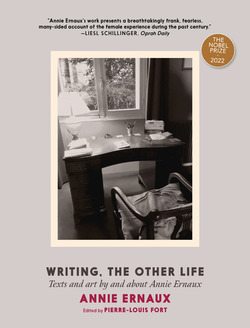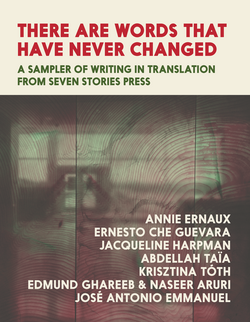“A profound and beautiful examination of the impenetrable wall that time erects between the self we are, and the selves we once were. I know of no other book that so vividly illustrates the frustrations and the temptations of that barrier, and our heartache and longing in trying to breach it. Annie Ernaux is one of my favorite contemporary writers, original and true. Always after reading one of her books, I walk around in her world for months.”
– Sheila Heti, author of Motherhood and How Should A Person Be?
“Another deeply felt, fearlessly honest exploration of female desire, shame, and intellectual passion from the incomparable Annie Ernaux.”
– Sigrid Nunez, author of The Friend
“In this devastating yet deceptively simple work of autofiction, Annie Ernaux retraces the origins of her identity as an artist to the height of the Algerian War, and the loss of her innocence at the cusp of womanhood. Sifting through the wreckage of her memory, she queries its nature: whether we possess it, construct it, or view it like a photograph, or as a form of cinema; whether, long suppressed, it may be resurrected and reconstituted as narrative—and where, in such an act, the author ends and the character of the author begins. 'What is the belief that drives her, if not that memory is a form of knowledge?' she asks. In A Girl’s Story, Ernaux cements her position as a writer of immense depth and grace.”
– Sarah Gerard, author of Sunshine State: Essays
“Annie Ernaux writes memoir with such generosity and vulnerable power that I find it difficult to separate my own memories from hers long after I’ve finished reading. In A Girl’s Story she detangles an adolescence rife with desire and shame, an era of both internal and external debasement. Ernaux wisely ventures into the gray areas of her memories; she doesn’t attempt to transcend their power, nor to even 'understand' them, but to press them firmly into this diamond of a book.”
– Catherine Lacey, author of Certain American States
“Ernaux, one of France’s leading contemporary writers, mines her shame to good effect. There’s no hysteria or prurience in her writing; she approaches her history with precision, never sentimentality. ... Revisiting painful periods is hardly new territory for writers, but Ernaux distills a particular power from the exercise. As she puts it, 'I am endowed by shame’s vast memory, more detailed and implacable than any other, a gift unique to shame.”
– Joumana Khatib, The New York Times Book Review
“The books are whittled down to an intense core—not a confession but a kind of personal epistemology. ... One way to read Ernaux’s book is as an attempt to understand that opaque, painful, essential process of “becoming.”
– Madeleine Schwartz, The New Yorker
“Written in 2013, although coming out a few years later, A Girl’s Story predates Me Too as a narrative genre, but Ernaux’s body of work speaks to the simplest and possibly best thing Me Too offered women. It is her foundational exigency: how to remember politically, in collective form... Across the ample particularities of over 40 years and 21 books, almost all short, subject-driven memoirs, Ernaux has fundamentally destabilized and reinvented the genre in French literature.”
– Audrey Wollen, The Nation
“Since the 1970s, Ernaux has carved out a special place in the French literary pantheon for her ability not just to excavate individual memories, but to show the subtle ways they interact with the collective experience... Now, readers in English are catching on.”
– Laura Cappelle, The New York Times
“Annie Ernaux’s A GIRL’S STORY was the most appallingly true rendition of the adolescent girl’s twinned shame and voracious hunger I’ve ever read.”
– Megan Nolan, The White Review
“I came late to this French writer, who is becoming better known in English translation, and the shock of recognition has not subsided. Every so often you realise there is a great writer out there, a whole world you have yet to explore, and with someone this good, you want to take it slowly.”
– Anne Enright in The Irish Times
“I do not have a more elegant way of expressing my admiration for Ernaux’s writing. The way she manages to weave the larger streams of France’s sociopolitical and cultural landscape into the tale she spins of her parents’ lives and her own. It is a masterful and hard to achieve balance between the broader forces that shape a person’s life, and these small details that make someone their own unrepeatable self.”
– Stiliana Milkova, Reading in Translation



































